Resume
Allergist Cover Letter Examples

May 29, 2025
|
12 min read
Crafting your allergist cover letter with a perfect prescription of words can be challenging. Get tips to make your letter so good it “nose” what the hiring manager wants, helping you stand out in the job search.
4.70 Average rating
Rated by 348 people
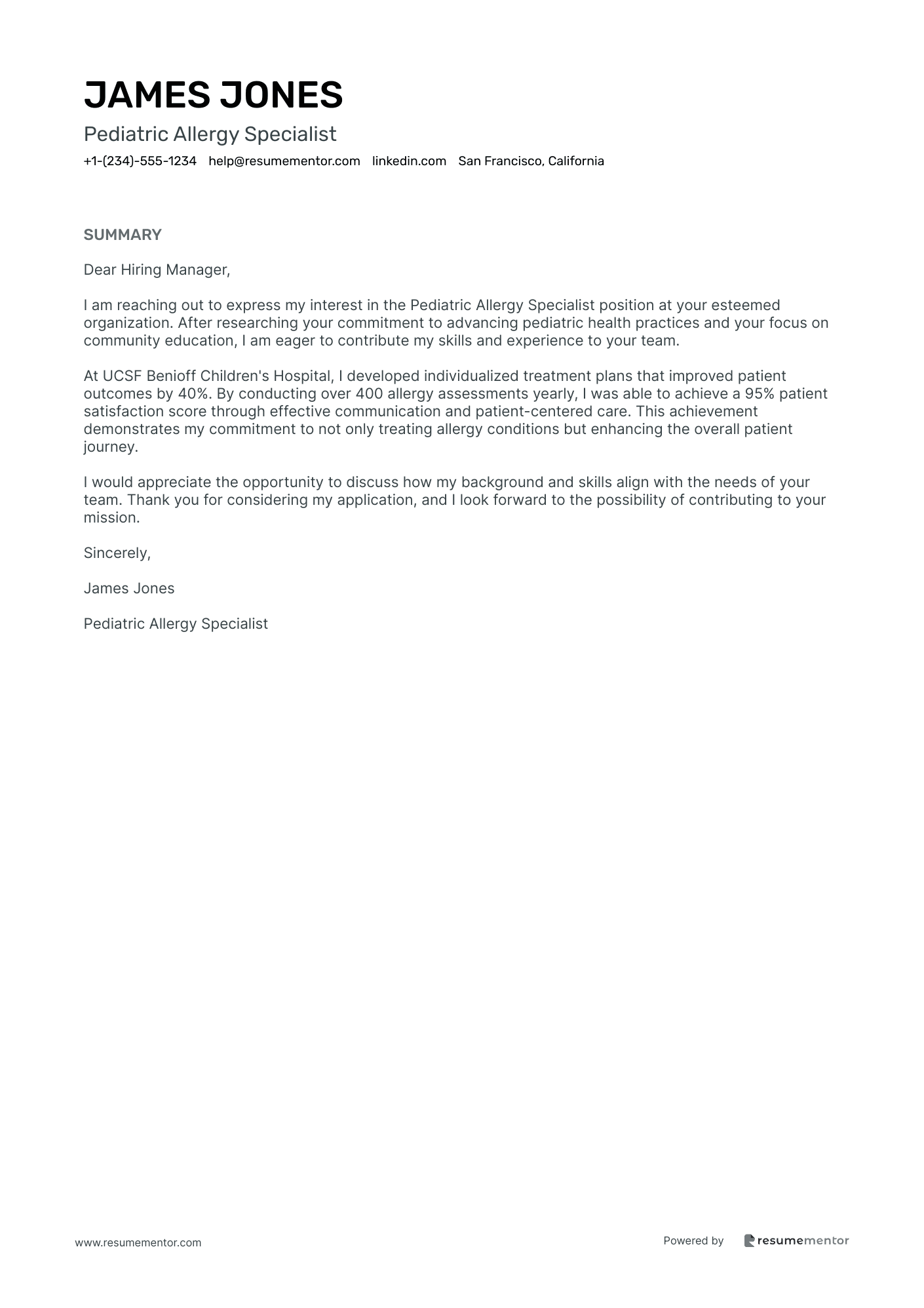
Pediatric Allergy Specialist
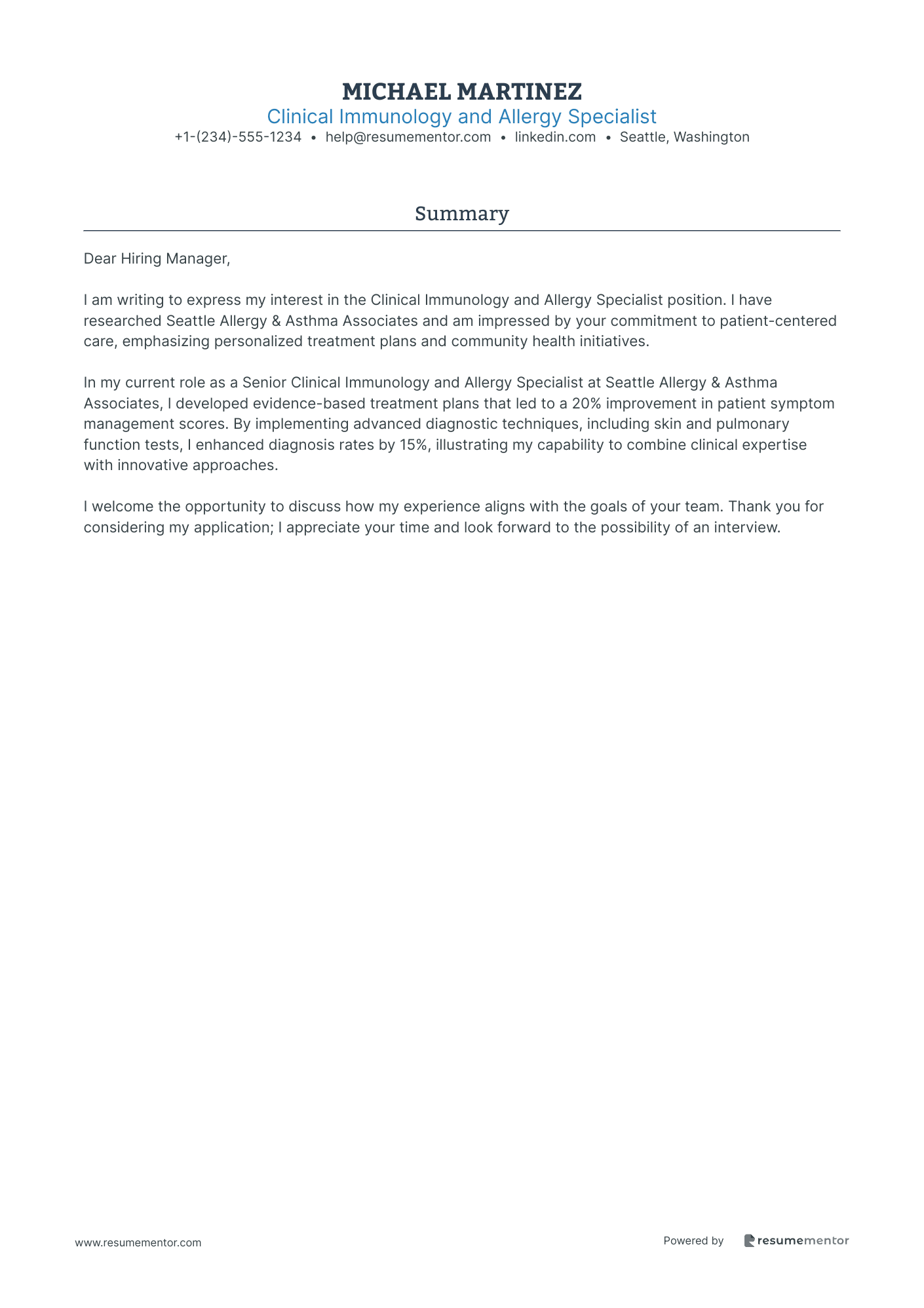
Clinical Immunology and Allergy Specialist
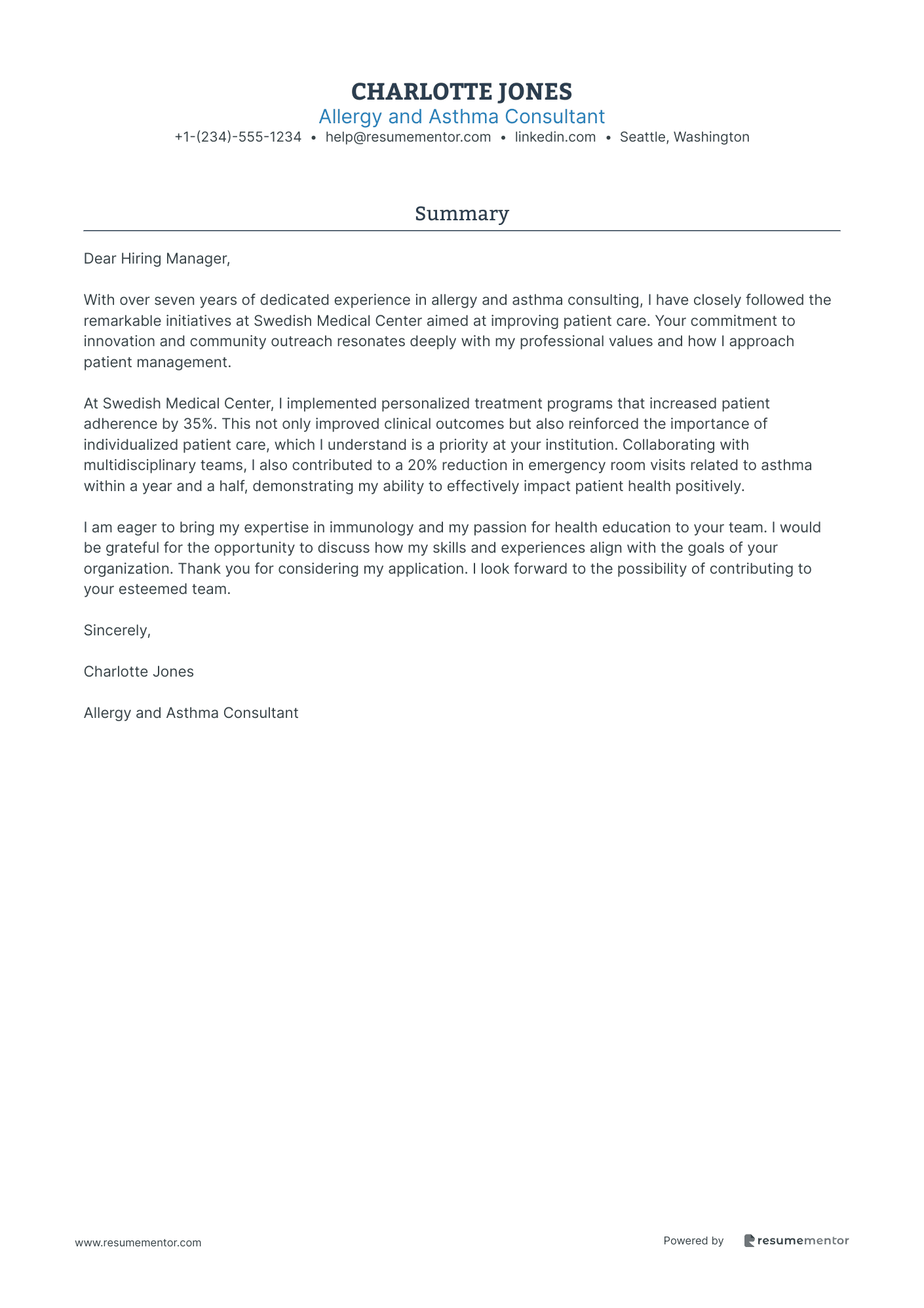
Allergy and Asthma Consultant
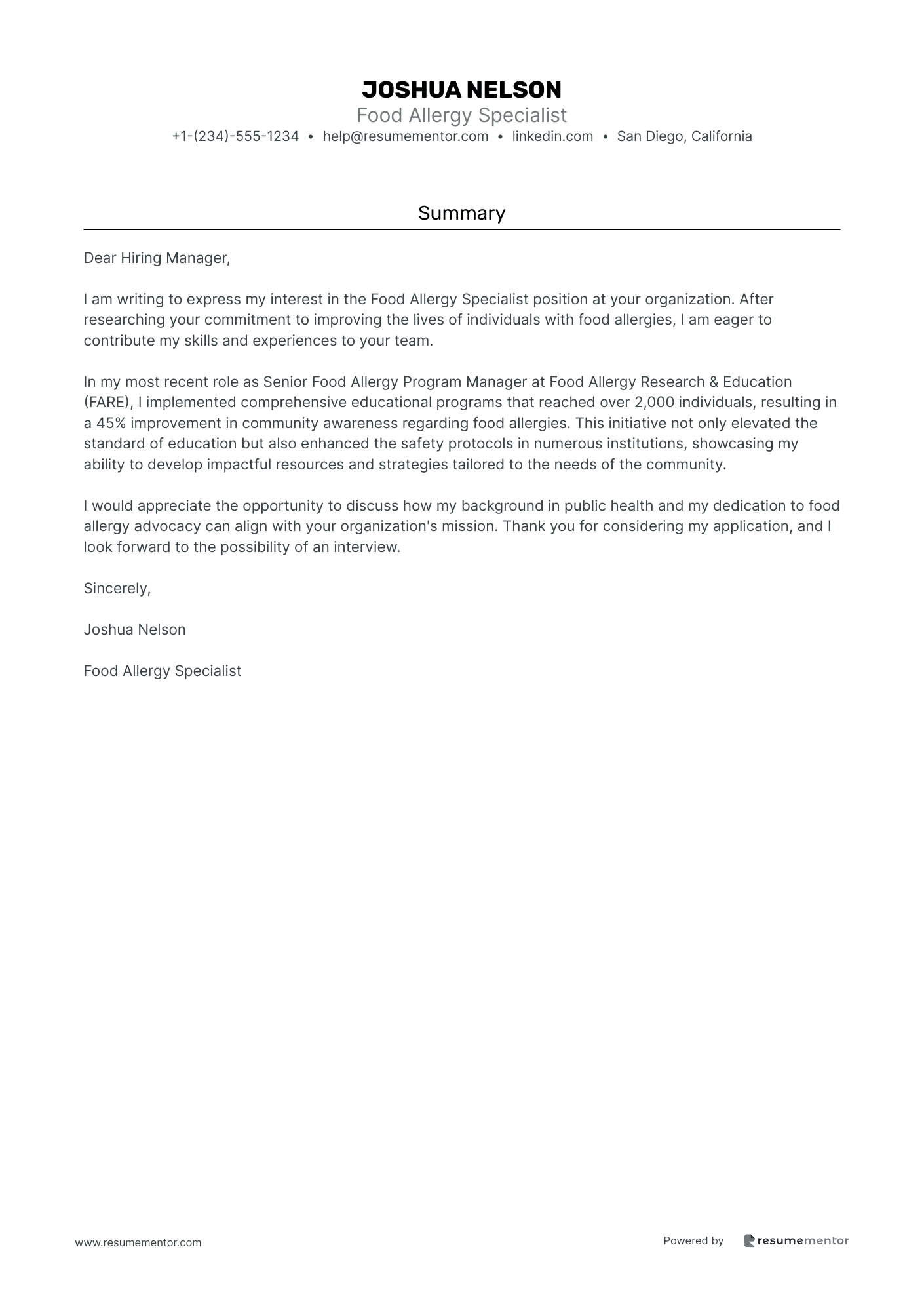
Food Allergy Specialist
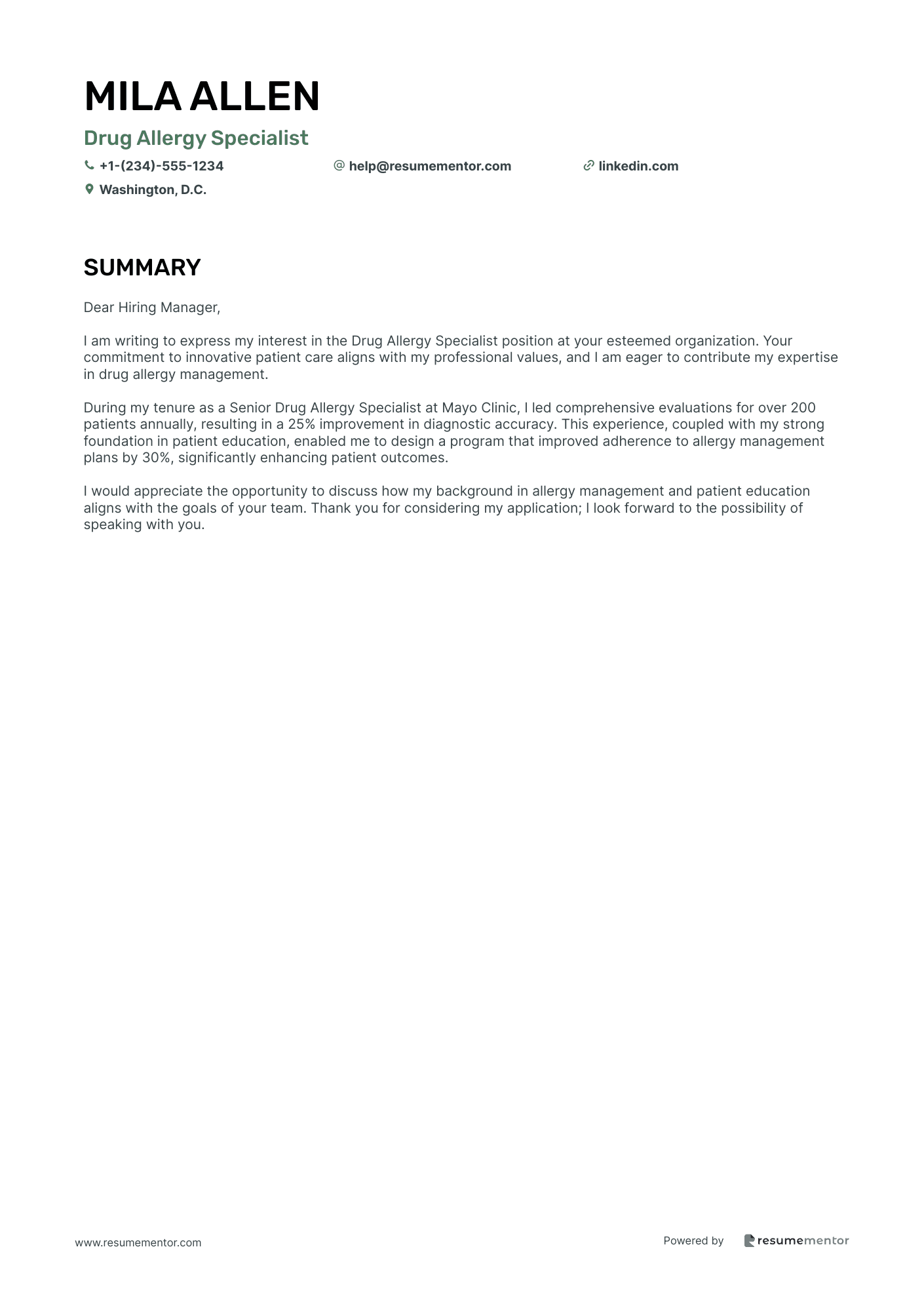
Drug Allergy Specialist
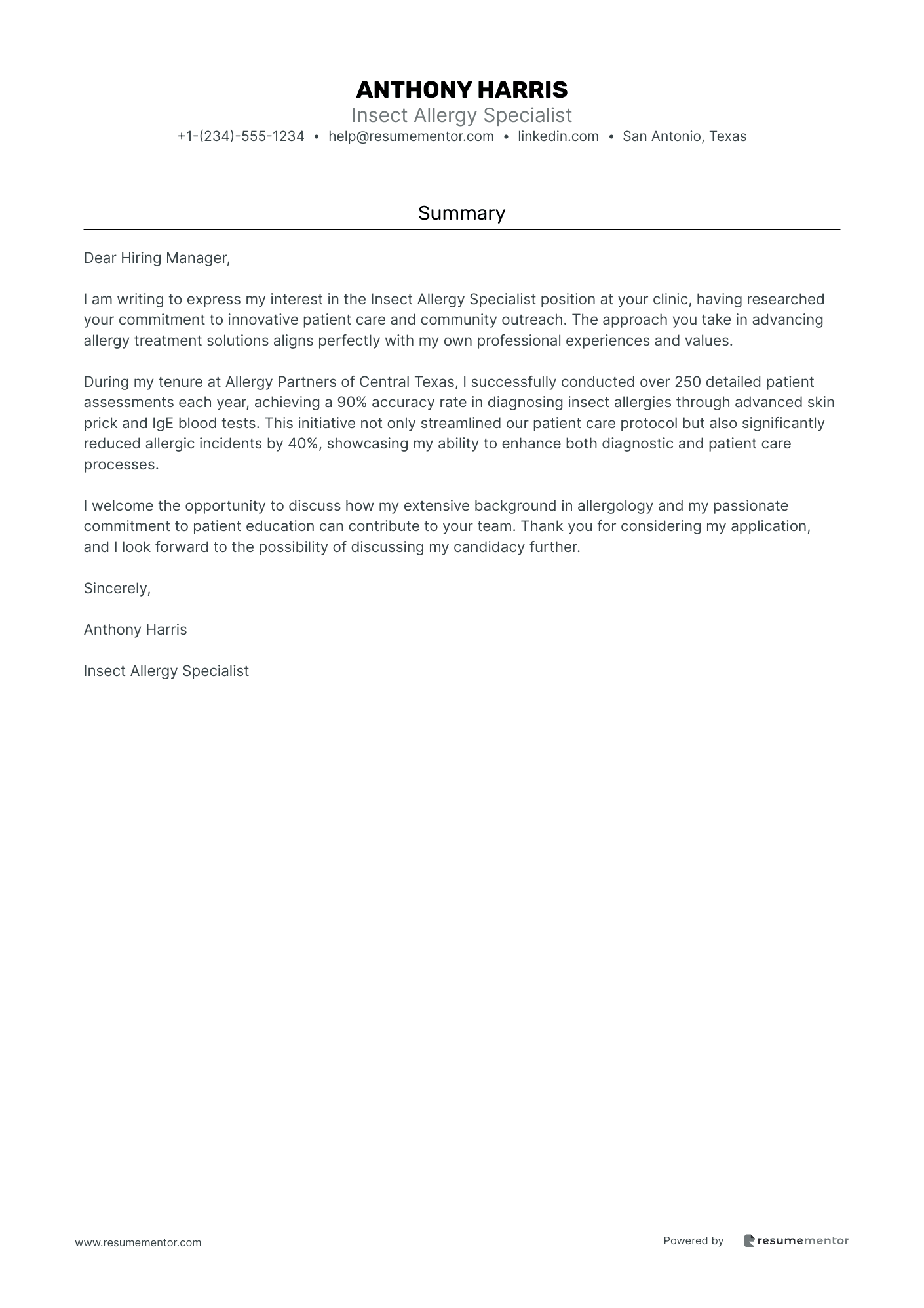
Insect Allergy Specialist
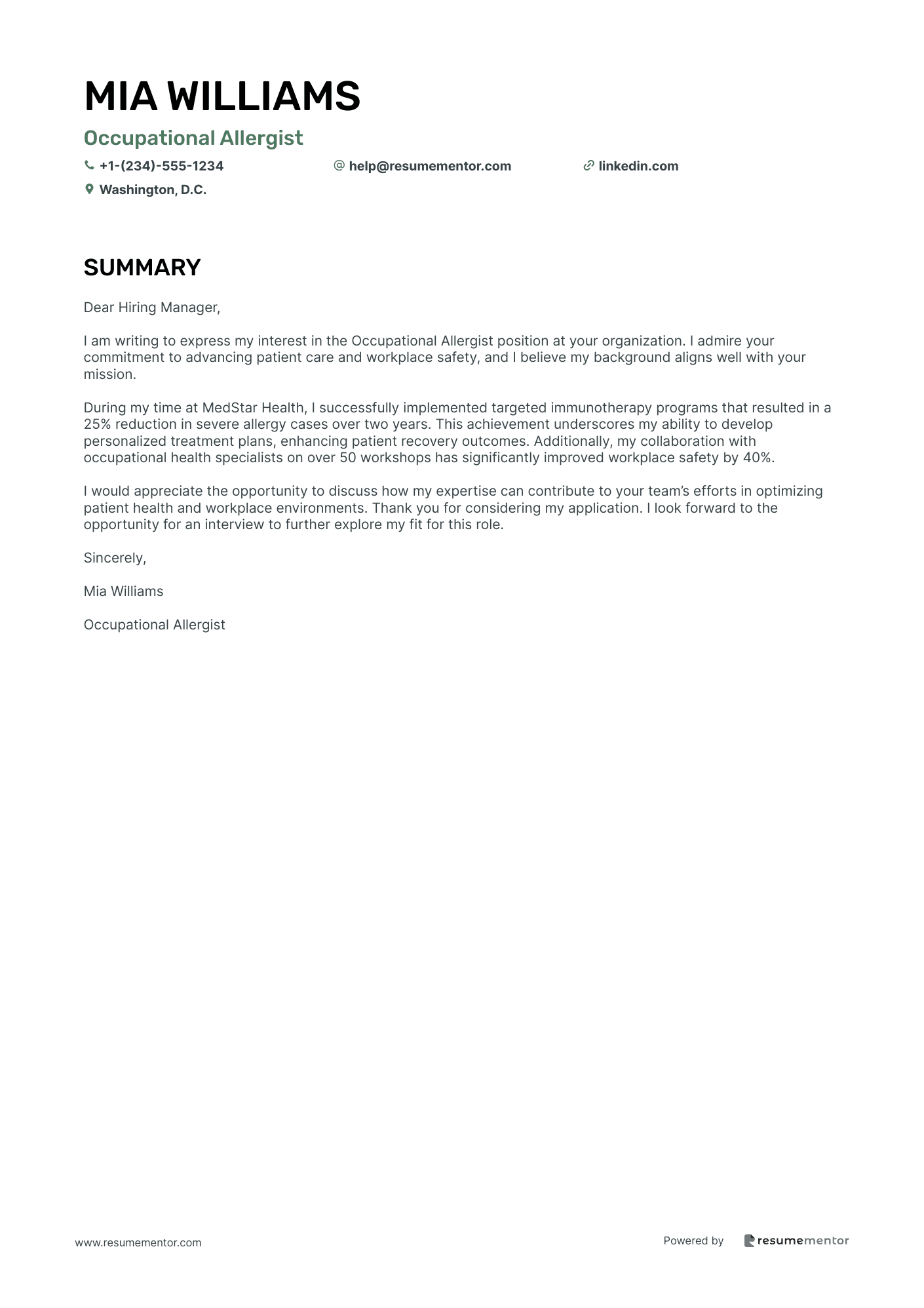
Occupational Allergist
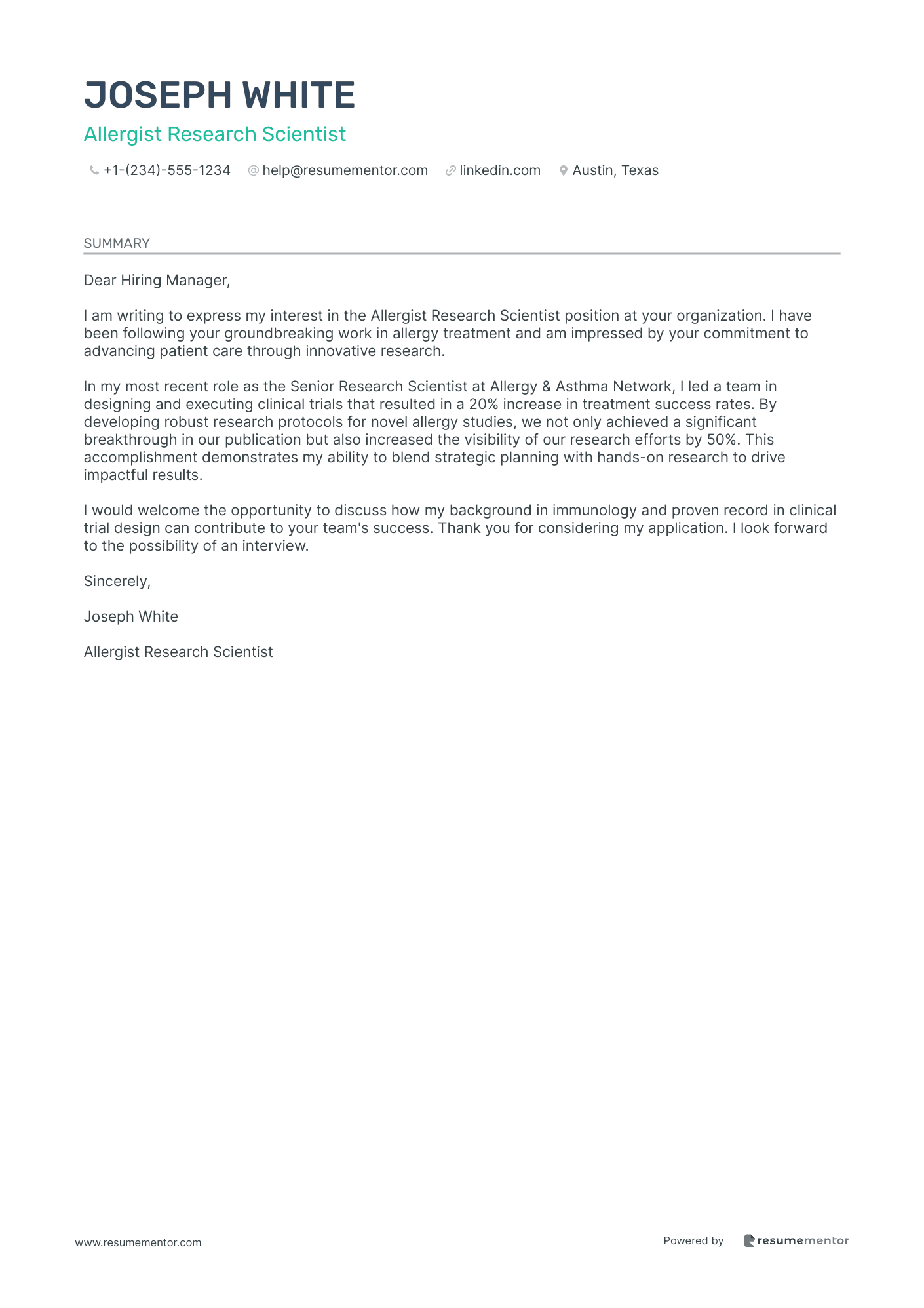
Allergist Research Scientist
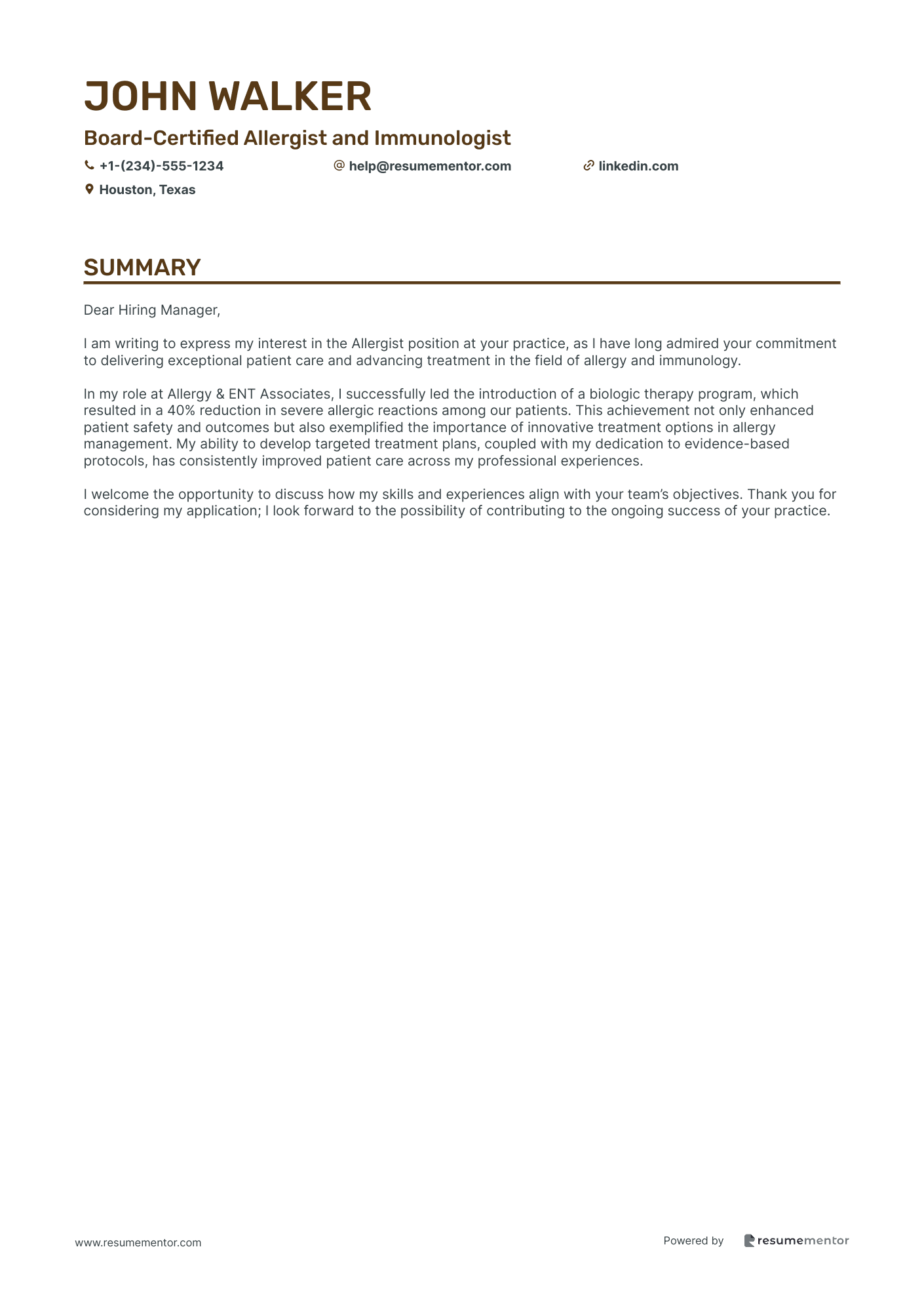
Board-Certified Allergist and Immunologist
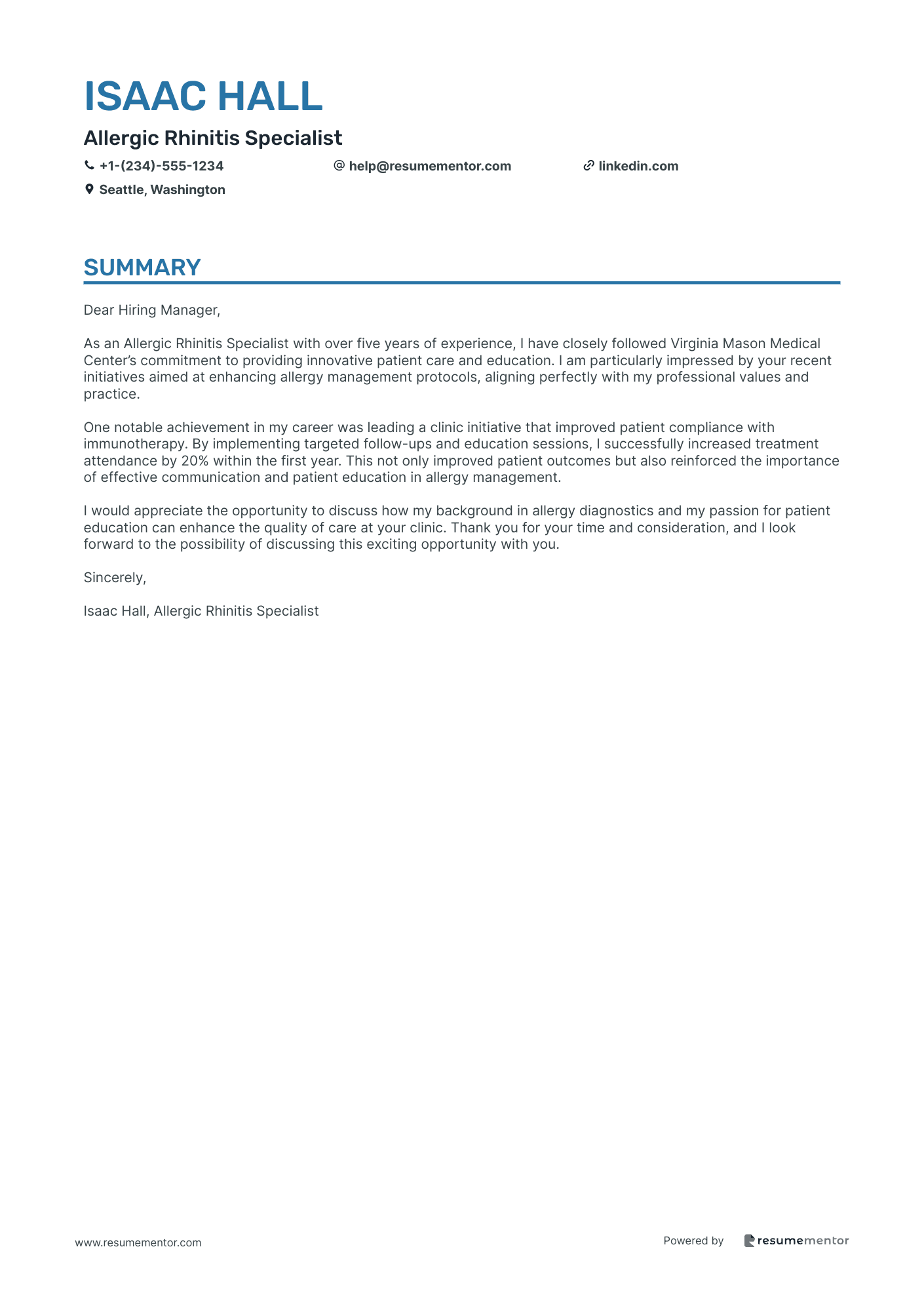
Allergic Rhinitis Specialist

Pediatric Allergy Specialist cover letter sample
When applying for this role, it’s important to stress your experience with allergic conditions in pediatrics. Highlight any specialized training or fellowships in allergy and immunology. Certifications, such as board certification in allergy and pediatric care, should be clearly stated. Discuss your skills in diagnosing and managing complex allergic reactions in children. Include specific examples of successful treatment plans and how they improved patient outcomes, showcasing a 'skill-action-result' approach. Your ability to communicate effectively with both patients and parents is also essential.
James Jones
Pediatric Allergy Specialist
Summary
Dear Hiring Manager,
I am reaching out to express my interest in the Pediatric Allergy Specialist position at your esteemed organization. After researching your commitment to advancing pediatric health practices and your focus on community education, I am eager to contribute my skills and experience to your team.
At UCSF Benioff Children's Hospital, I developed individualized treatment plans that improved patient outcomes by 40%. By conducting over 400 allergy assessments yearly, I was able to achieve a 95% patient satisfaction score through effective communication and patient-centered care. This achievement demonstrates my commitment to not only treating allergy conditions but enhancing the overall patient journey.
I would appreciate the opportunity to discuss how my background and skills align with the needs of your team. Thank you for considering my application, and I look forward to the possibility of contributing to your mission.
Sincerely,
James Jones
Pediatric Allergy Specialist
Clinical Immunology and Allergy Specialist cover letter sample
When crafting your cover letter, focus on your experience with diagnosing and treating allergic conditions and immune disorders. Highlight your familiarity with relevant procedures and techniques, such as skin testing and immunotherapy. If you have worked with multidisciplinary teams, mention your collaborative skills, as they are essential in this field. Include any certifications or training, like a board certification in allergy and immunology, to show your dedication. Share specific examples of patient outcomes that resulted from your interventions to demonstrate effectiveness and commitment to patient care.
Michael Martinez
Clinical Immunology and Allergy Specialist
Summary
Dear Hiring Manager,
I am writing to express my interest in the Clinical Immunology and Allergy Specialist position. I have researched Seattle Allergy & Asthma Associates and am impressed by your commitment to patient-centered care, emphasizing personalized treatment plans and community health initiatives.
In my current role as a Senior Clinical Immunology and Allergy Specialist at Seattle Allergy & Asthma Associates, I developed evidence-based treatment plans that led to a 20% improvement in patient symptom management scores. By implementing advanced diagnostic techniques, including skin and pulmonary function tests, I enhanced diagnosis rates by 15%, illustrating my capability to combine clinical expertise with innovative approaches.
I welcome the opportunity to discuss how my experience aligns with the goals of your team. Thank you for considering my application; I appreciate your time and look forward to the possibility of an interview.
Allergy and Asthma Consultant cover letter sample
When applying for this role, emphasize any experience in patient care or healthcare consultation. Highlight your understanding of allergy and asthma management techniques, as well as any relevant certifications or training in respiratory health. It's crucial to demonstrate strong interpersonal skills, as building relationships with patients is key. Provide examples of how you’ve communicated complex medical information clearly and effectively, and detail instances where you’ve developed treatment plans that improved patient outcomes, following a 'skill-action-result' approach.
Charlotte Jones
Allergy and Asthma Consultant
Summary
Dear Hiring Manager,
With over seven years of dedicated experience in allergy and asthma consulting, I have closely followed the remarkable initiatives at Swedish Medical Center aimed at improving patient care. Your commitment to innovation and community outreach resonates deeply with my professional values and how I approach patient management.
At Swedish Medical Center, I implemented personalized treatment programs that increased patient adherence by 35%. This not only improved clinical outcomes but also reinforced the importance of individualized patient care, which I understand is a priority at your institution. Collaborating with multidisciplinary teams, I also contributed to a 20% reduction in emergency room visits related to asthma within a year and a half, demonstrating my ability to effectively impact patient health positively.
I am eager to bring my expertise in immunology and my passion for health education to your team. I would be grateful for the opportunity to discuss how my skills and experiences align with the goals of your organization. Thank you for considering my application. I look forward to the possibility of contributing to your esteemed team.
Sincerely,
Charlotte Jones
Allergy and Asthma Consultant
Food Allergy Specialist cover letter sample
When applying for this position, emphasize any relevant experience with food safety, nutrition, or allergy management. Highlight your understanding of food labeling laws and allergen cross-contamination prevention. If you have completed workshops or certifications related to food allergies, be sure to mention them, including the duration of training. Provide specific examples of how your expertise has improved safety protocols or enhanced customer satisfaction in previous roles, using a 'skill-action-result' approach to demonstrate the impact of your work.
Joshua Nelson
Food Allergy Specialist
Summary
Dear Hiring Manager,
I am writing to express my interest in the Food Allergy Specialist position at your organization. After researching your commitment to improving the lives of individuals with food allergies, I am eager to contribute my skills and experiences to your team.
In my most recent role as Senior Food Allergy Program Manager at Food Allergy Research & Education (FARE), I implemented comprehensive educational programs that reached over 2,000 individuals, resulting in a 45% improvement in community awareness regarding food allergies. This initiative not only elevated the standard of education but also enhanced the safety protocols in numerous institutions, showcasing my ability to develop impactful resources and strategies tailored to the needs of the community.
I would appreciate the opportunity to discuss how my background in public health and my dedication to food allergy advocacy can align with your organization's mission. Thank you for considering my application, and I look forward to the possibility of an interview.
Sincerely,
Joshua Nelson
Food Allergy Specialist
Drug Allergy Specialist cover letter sample
When applying for this role, it's important to emphasize your clinical experience in allergy and immunology. Highlight any specialized training in drug allergy testing and desensitization protocols. Showcase your ability to work collaboratively with healthcare teams to manage patient care effectively. Include specific examples of cases where you identified drug allergies and the positive outcomes achieved through your interventions. Demonstrating your skills in patient education and your understanding of pharmacology will strengthen your application and show your commitment to improving patient safety.
Summary
Dear Hiring Manager,
I am writing to express my interest in the Drug Allergy Specialist position at your esteemed organization. Your commitment to innovative patient care aligns with my professional values, and I am eager to contribute my expertise in drug allergy management.
During my tenure as a Senior Drug Allergy Specialist at Mayo Clinic, I led comprehensive evaluations for over 200 patients annually, resulting in a 25% improvement in diagnostic accuracy. This experience, coupled with my strong foundation in patient education, enabled me to design a program that improved adherence to allergy management plans by 30%, significantly enhancing patient outcomes.
I would appreciate the opportunity to discuss how my background in allergy management and patient education aligns with the goals of your team. Thank you for considering my application; I look forward to the possibility of speaking with you.
Insect Allergy Specialist cover letter sample
When crafting your cover letter, underscore any relevant experience in allergy testing and treatment. Highlight your ability to identify specific insect allergens and the methods you use for testing and diagnosis. If you have certifications in allergen assessment or immunotherapy, be sure to mention them. Include examples of how your interventions have improved patient outcomes, such as reducing symptoms or improving quality of life. Emphasizing strong analytical skills and a commitment to patient education can further enhance your application.
Anthony Harris
Insect Allergy Specialist
Summary
Dear Hiring Manager,
I am writing to express my interest in the Insect Allergy Specialist position at your clinic, having researched your commitment to innovative patient care and community outreach. The approach you take in advancing allergy treatment solutions aligns perfectly with my own professional experiences and values.
During my tenure at Allergy Partners of Central Texas, I successfully conducted over 250 detailed patient assessments each year, achieving a 90% accuracy rate in diagnosing insect allergies through advanced skin prick and IgE blood tests. This initiative not only streamlined our patient care protocol but also significantly reduced allergic incidents by 40%, showcasing my ability to enhance both diagnostic and patient care processes.
I welcome the opportunity to discuss how my extensive background in allergology and my passionate commitment to patient education can contribute to your team. Thank you for considering my application, and I look forward to the possibility of discussing my candidacy further.
Sincerely,
Anthony Harris
Insect Allergy Specialist
Occupational Allergist cover letter sample
When applying for this position, emphasize your clinical experience in diagnosing and managing allergic conditions. Highlight any advanced training in immunology or specific certifications, such as those related to allergy and immunology. Mention relevant research projects or publications in the field to demonstrate your expertise. Additionally, provide examples of how your interventions have improved patient outcomes, using a 'skill-action-result' format. Showing your commitment to patient education and advocacy will also strengthen your application and demonstrate your dedication to improving quality of life for those affected.
Mia Williams
Occupational Allergist
Summary
Dear Hiring Manager,
I am writing to express my interest in the Occupational Allergist position at your organization. I admire your commitment to advancing patient care and workplace safety, and I believe my background aligns well with your mission.
During my time at MedStar Health, I successfully implemented targeted immunotherapy programs that resulted in a 25% reduction in severe allergy cases over two years. This achievement underscores my ability to develop personalized treatment plans, enhancing patient recovery outcomes. Additionally, my collaboration with occupational health specialists on over 50 workshops has significantly improved workplace safety by 40%.
I would appreciate the opportunity to discuss how my expertise can contribute to your team’s efforts in optimizing patient health and workplace environments. Thank you for considering my application. I look forward to the opportunity for an interview to further explore my fit for this role.
Sincerely,
Mia Williams
Occupational Allergist
Allergist Research Scientist cover letter sample
When applying for this position, focus on your research experience in immunology or related fields. Highlight any clinical trials you have been involved in and any publications you have authored. This demonstrates your ability to contribute to the scientific community. Additionally, showcase your analytical skills and proficiency in lab techniques, such as flow cytometry or ELISA. Provide examples of how your research has led to advancements in understanding allergies or improving treatment methods. Use a 'project-skill-impact' format to clearly convey your contributions.
Joseph White
Allergist Research Scientist
Summary
Dear Hiring Manager,
I am writing to express my interest in the Allergist Research Scientist position at your organization. I have been following your groundbreaking work in allergy treatment and am impressed by your commitment to advancing patient care through innovative research.
In my most recent role as the Senior Research Scientist at Allergy & Asthma Network, I led a team in designing and executing clinical trials that resulted in a 20% increase in treatment success rates. By developing robust research protocols for novel allergy studies, we not only achieved a significant breakthrough in our publication but also increased the visibility of our research efforts by 50%. This accomplishment demonstrates my ability to blend strategic planning with hands-on research to drive impactful results.
I would welcome the opportunity to discuss how my background in immunology and proven record in clinical trial design can contribute to your team's success. Thank you for considering my application. I look forward to the possibility of an interview.
Sincerely,
Joseph White
Allergist Research Scientist
Board-Certified Allergist and Immunologist cover letter sample
When applying for this position, it's important to emphasize any clinical rotations or fellowships related to allergy and immunology. Highlight your board certification status and any ongoing education or research you’ve engaged in, such as attending conferences or publishing articles. Strong patient management skills and the ability to communicate complex medical information clearly are vital. Include specific examples of successful patient outcomes, using the 'skill-action-result' format to demonstrate how your expertise has improved patient care, compliance, or satisfaction.
John Walker
Board-Certified Allergist and Immunologist
Summary
Dear Hiring Manager,
I am writing to express my interest in the Allergist position at your practice, as I have long admired your commitment to delivering exceptional patient care and advancing treatment in the field of allergy and immunology.
In my role at Allergy & ENT Associates, I successfully led the introduction of a biologic therapy program, which resulted in a 40% reduction in severe allergic reactions among our patients. This achievement not only enhanced patient safety and outcomes but also exemplified the importance of innovative treatment options in allergy management. My ability to develop targeted treatment plans, coupled with my dedication to evidence-based protocols, has consistently improved patient care across my professional experiences.
I welcome the opportunity to discuss how my skills and experiences align with your team’s objectives. Thank you for considering my application; I look forward to the possibility of contributing to the ongoing success of your practice.
Allergic Rhinitis Specialist cover letter sample
When crafting your cover letter, focus on any previous experience in allergen management or patient education. Highlight your ability to identify symptoms and recommend effective treatments. Detail your understanding of current guidelines and best practices in allergy care. If you’ve participated in relevant training or workshops, mention those and include any certifications you've earned. Use specific examples of how your interventions led to improved patient outcomes, demonstrating your problem-solving skills and commitment to quality care in your previous roles.
Isaac Hall
Allergic Rhinitis Specialist
Summary
Dear Hiring Manager,
As an Allergic Rhinitis Specialist with over five years of experience, I have closely followed Virginia Mason Medical Center’s commitment to providing innovative patient care and education. I am particularly impressed by your recent initiatives aimed at enhancing allergy management protocols, aligning perfectly with my professional values and practice.
One notable achievement in my career was leading a clinic initiative that improved patient compliance with immunotherapy. By implementing targeted follow-ups and education sessions, I successfully increased treatment attendance by 20% within the first year. This not only improved patient outcomes but also reinforced the importance of effective communication and patient education in allergy management.
I would appreciate the opportunity to discuss how my background in allergy diagnostics and my passion for patient education can enhance the quality of care at your clinic. Thank you for your time and consideration, and I look forward to the possibility of discussing this exciting opportunity with you.
Sincerely,
Isaac Hall, Allergic Rhinitis Specialist
Related Articles

Continue Reading
Check more recommended readings to get the job of your dreams.
Resume
Resources
Tools
© 2026. All rights reserved.
Made with love by people who care.
